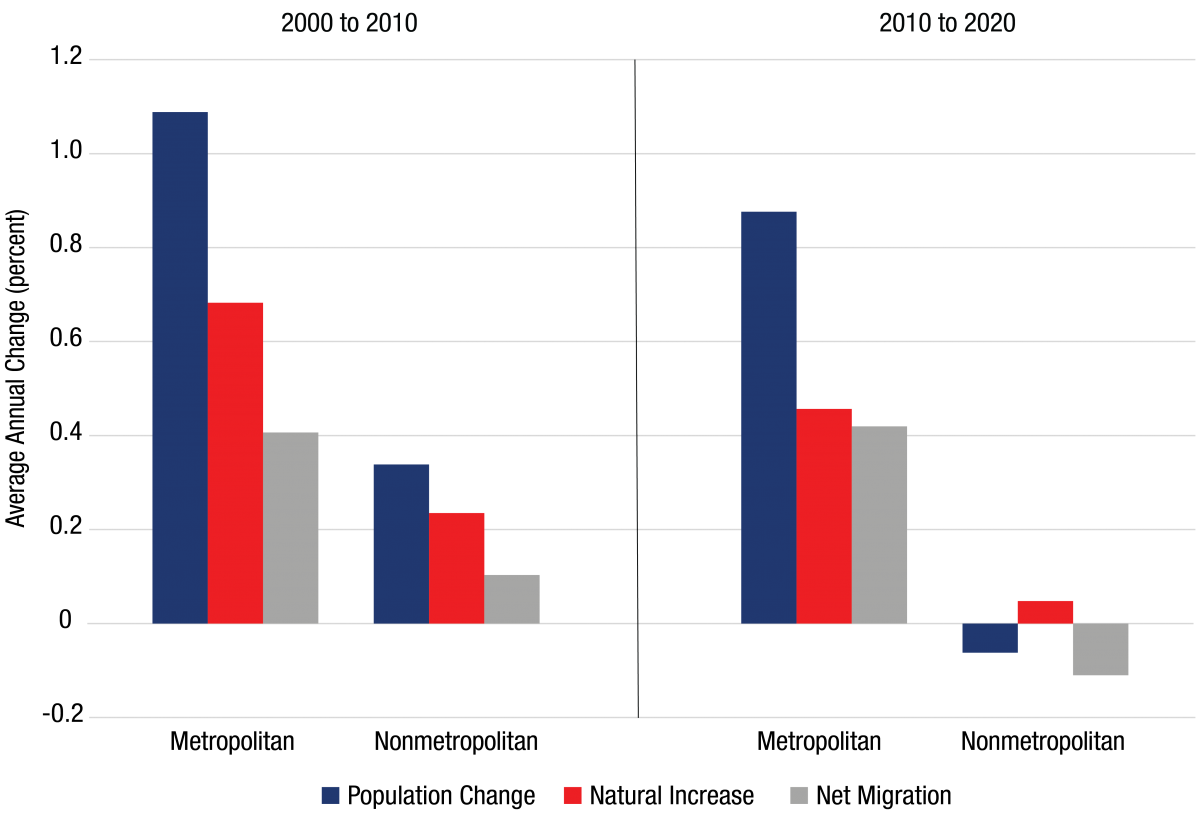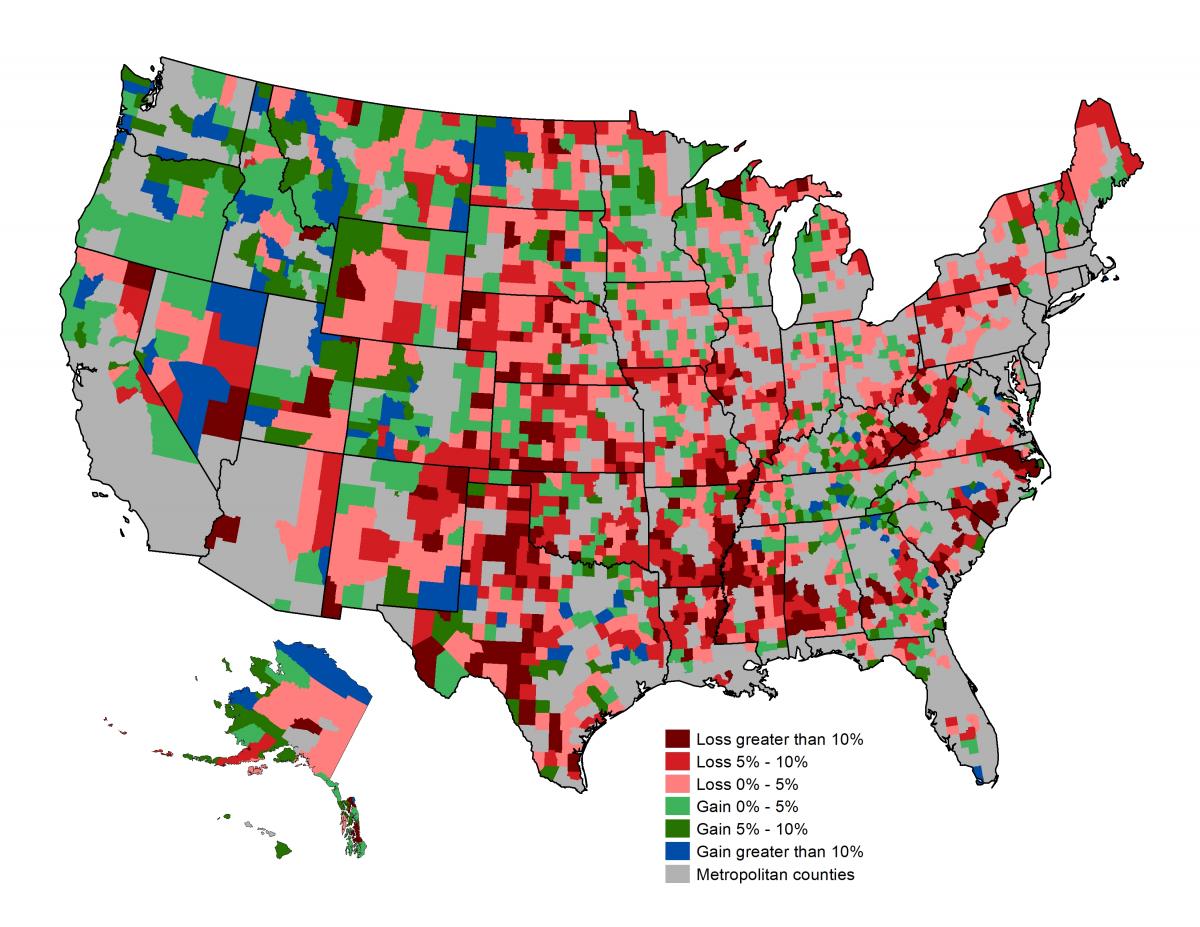“It is what it is.”
That’s a statement I hear all the time. Especially about old timber towns with closed mills, coal communities with abandoned mines, and rural areas whose number one export is young people.
Between 2010 and 2020, rural America experienced an overall population loss for the first time in history. Remote rural counties felt the losses most. But even in the exurbs, the rural areas next to large population centers, the population gains were far less than in the previous decade.
Population Change In Nonmetropolitan Counties, 2000 To 2020

Economists attribute this decline largely to the turbulence of the Great Recession. Over a decade ago factories and businesses shut down in small towns and rural communities and never came back.
When the jobs left long-time residents followed and potential newcomers went elsewhere. This was especially true for the younger generation who moved to larger cities to raise a family.
Today, in one out of every three rural communities, it’s more common to read an obituary than a new birth announcement in the local paper. And that’s only become more true in light of COVID-19.
Population Change In Nonmetropolitan Counties, 2010 To 2020

We’ve been held back for too long
For decades, greed, red tape, and good old-fashioned ignorance kept the Federal Government from taking action to address the challenges facing today’s rural America.
On the right, politicians use talking points about freedom and self-reliance to deregulate special interest industry groups. These groups in turn, consolidated the agriculture sector leaving America’s family farmers with lower prices, fewer choices, and huge debts to pay for inputs like seeds and fertilizer.
On the left, many Democrats have all but given up on rural voters. They leave their rural engagement efforts to K Street lobbyists, or pursuing one size fits all policies without much attention to the specific needs of rural communities.
It get’s worst. USDA is most often tasked with leading federal rural policy, even though federal rural programs are scattered across multiple departments. Without a centralized agency or coordinating body to oversee implementation — and comparatively little investment in rural development research and policy development — it’s hard for tax dollars tagged for rural places to make a real impact.
But it’s not all bad news.
As rural people, we know our communities better than anyone and we are the ones best positioned to create local jobs and opportunities.
Matt Hildreth
Many rural people aren’t waiting any longer for relief
While often missed by the traditional media, there is a growing group of us in rural America who refuse to go down without a fight. And after two long years, we’ve just had our first billion-dollar breakthrough.
As rural people, we are the ones best positioned to create local jobs and opportunities. We know our communities better than anyone. For some rural communities, the barriers to job creation may be a lack of high-speed internet or our crumbling transportation infrastructure. Other communities may need more workers with skills in growing industries or job retention resources like childcare services.
For nearly two years, thousands of us in small towns across the country have pushed our elected officials in Washington, DC to act. We need resources that support leaders working from the ground up to improve good-paying jobs and wages in persistently distressed communities.
Last week, Congress created a new $1 billion program specifically designed to create good jobs and economic activity communities that have been left behind.
Our work is already getting results
Rep. Derek Kilmer who lead the charge on the new program grew up on the peninsula, designed the program to focus on targeting federal resources to the communities who need them most so the new “RECOMPETE ” program creates 10-year economic aid and grant programs to expand broadband, reconstruct infrastructure, clean up brownfields where pollution prohibits the development, and provide resources that support small, local businesses.
Watch Rep. Derek Kilmer discuss the RECOMPETE Act
About one-sixth of Americans live in “distressed communities,” according to the Upjohn Institute’s research. These Americans can use the new RECOMPETE grants for a wide variety of purposes, including:
- Business advice for small and medium-sized local businesses and entrepreneurs, such as manufacturing extension services and small business development centers.
- Land and site development, such as brownfield redevelopment, research and technology parks, business incubators, business corridor development, and Main Street redevelopment.
- Infrastructure and housing, such as improvements in transit, roads, broadband access, and affordable and workforce housing development.
- Job training oriented to regional or local labor market needs, such as customized job training programs run by local community colleges in partnership with local businesses.
- Workforce outreach programs that reach out to lower-income neighborhoods and embed job placement and training services in neighborhood institutions.
- Job retention programs for support services such as job success coaches, childcare services, or transportation support.
We still have a long road ahead of us
This new program is a billion dollar step in the right direction. But we still got a long road ahead of us. Over the next several months and years, we need to work together to ensure these funds make it to the communities that need them most.
We know that without a strong grassroots rural watchdog network many of the dollars intended for economically disadvantaged communities will just end up in the pockets of the good old boys.
But in a time when so many policies passed by Congress rely on an outdated “trickle down” approach, we know that our approach works. By working together we can change the status quo and rebuild rural economies from the bottom up.
Cause as I like to say, “It is what it is till it ain’t any more.”